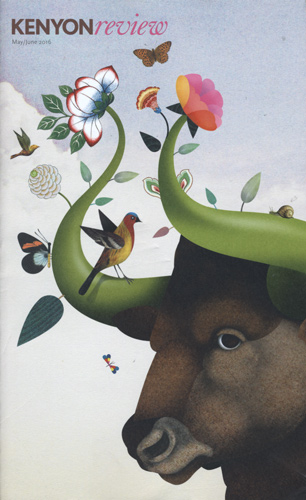Kenyon Review – May/June 2016
The May/June 2016 issue of Kenyon Review is so of-the-moment with its new section of “EcoPoetry,” wherein each poet gives a personal take on the deterioration of the world’s environment. Poetry Editor David Baker showcases 31 poems “awash with warning,” he says. “The devastation and peril often feel so massive they are already beyond words. But in important ways poetry is always about what is beyond mere words, just past our grasp and our understanding.”
The May/June 2016 issue of Kenyon Review is so of-the-moment with its new section of “EcoPoetry,” wherein each poet gives a personal take on the deterioration of the world’s environment. Poetry Editor David Baker showcases 31 poems “awash with warning,” he says. “The devastation and peril often feel so massive they are already beyond words. But in important ways poetry is always about what is beyond mere words, just past our grasp and our understanding.”
Benjamin Landry tackles the subject in “Witness”: “Given enough time, buildings / slouch with the bedrock.” Landry ends with these succinct lines, making his point: “[ . . . ] A beautiful / thing, our absence. It’s a pity / we can’t be there to witness it.”
Matthew Olzmann carries out his sentiment in “Plasticity,” which chronicles putting a message in a bottle, using the image of a man stuck on an island to speak about plastic and pollution:
Before, it was hard to find a bottle. The isolated man
had to pray one would wash ashore.
Now, the island might be made of bottles
and lawn chairs, and little plastic heads
of little plastic dolls.
Elsewhere, Marianne Boruch eases us into “It Moves,” which finds “Galileo showing off his telescope again,” taking us back in time, instead of ahead as Landry did, to 1611 Rome:
It ended badly, that Earth-around-the-sun thing.
The Inquisitor, heresy, the recanting, etc.,
except that parting whisper at the door but it moves is how
his fame works.
All is not strictly poetic in this issue. Sam Taylor writes an experimental work titled “[Wikipedia or the Late Style of Orpheus]” that combines memoir and verse. His starting point is text from Wikipedia about garbage that floats in the Pacific Ocean.
Rebecca McClanahan’s essay, “Tears, Silence, Song,” takes us back to September 11, 2001, as she revisits a journal entry for that day in which she lists: rescued a squirrel, made chocolate pudding, tried to give blood and tried to pray. In recalling sights, smells, sounds, and lack of sounds, she notes an omission from her list: “What surprises is what is missing: tears. The lowest form of grief, according to the Hasidic saying. Never mind the higher rungs—silence, song—I could not even reach the lowest.”
An unexpected source narrates Gregory Spatz’s “Unlovely, Unloved.” We meet a fifth-grade boy who has to choose a band or orchestra instrument. He picks what the boy in front of him does “because you heard him say it first, violin, and wanted in every regard either to be him, to grow up sooner, or to have his affection and attention, or to mug him in a dark alley (or to be mugged by him) and have him all to yourself. You chose, too. The violin.” So what’s the source? Violins uniquely tell the story: “Banged against your leg as you ran for the bus, thrown under the bed for the summer, tossed in the back of a car and left there overnight to freeze, [ . . . ] wood fibers shrinking inside varnish, so days later when you finally remembered, brought us in, threw open the case by the heater or the wood stove, you might watch in dismay and amusement as our varnish checked and crazed with cracks.”
Kenyon Review offers a rich variety of prose that balances and complements the poetry. The magazine’s editor, David H. Lynn, plans to have EcoPoetry a continuing feature, thus making the magazine meaningful reading for those concerned with maintaining the balance of nature in the space where we live. Shouldn’t that include everyone?
[www.kenyonreview.org]





